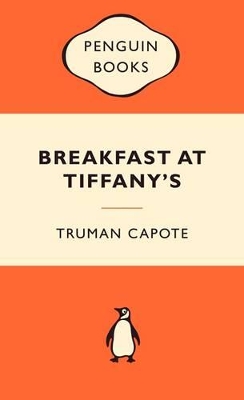Reviewed by Michael @ Knowledge Lost on
Breakfast at Tiffany’s tells the story of the unnamed narrator and Holly Golightly who are tenants in the same Upper East Side brownstone. The novella follows the narrator’s observations the life of this Manhattan café society girl. Holly has no job, but she survives by socialising with wealthy men who in turn give her money and expensive gifts.
It is important to note that Holly Golightly is not a prostitute; this is a popular misconception that is in fact debunked in the novel. There is a conversation about three thirds of the way through this novella where Holly says she could never be a prostitute, she can’t separate love and sex. Even Truman Capote had to come out and say that she wasn’t a prostitute, saying in an interview that “[Holly] was the prototype of today’s liberated female and representative of a whole breed of girls who live off men but are not prostitutes. They’re our version of the geisha girl.”
It is hard not to compare Breakfast at Tiffany’s the novella with the movie, everyone has seen the movie but I wish the book was celebrated for its brilliance. The movie has a focus on romance but that’s way off. What I found in the novel was friendship, isolation and on a very basic level hopes and dreams. There was an element of love in the novella but less traditional love, more of a focus on unrequited love (the wealthy men’s towards Holly) and love between friends.
I do have to wonder if the unnamed narrator has an autobiographical element to him. Both the narrator and Truman Capote share the same birthday, (the same birthday as me, 30th of September). I don’t know much more about Capote’s life but sharing a birthday makes me wonder. Holly was modelled after multiple women in Capote’s life, women he considered friends. I might find a biography of Truman Capote to learn more about it.
I listened to the audiobook of this novella read by Michael C. Hall and all I can think of was Dexter Morgan. The unnamed narrator in Breakfast at Tiffany’s had a similar narration style to that of Dexter and I kept waiting for something slightly sinister to happen. None of the characters were sociopaths like Dexter but I do think it enhanced my experience.
I loved this novella and highly recommend it to anyone who hasn’t read it. I didn’t remember reading much from the movie when I picked up this book; luckily, I think that might have tainted the experience. Capote’s writing was incredible and I feel like I need to read more of his, In Cold Blood is obviously a priority, although a biography might be beneficial first.
This review originally appeared on my blog; http://literary-exploration.com/2014/04/03/breakfast-at-tiffanys-by-truman-capote/
Reading updates
- Started reading
- 9 March, 2014: Finished reading
- 9 March, 2014: Reviewed
